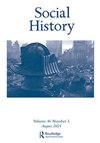在希特勒的慕尼黑:犹太人、革命和纳粹主义的兴起
IF 1.1
1区 历史学
Q1 HISTORY
引用次数: 0
摘要
意识形态应该促使人们寻找一种新的劳动价值,追求一种不同的工作方式,更广泛地说,可能是对劳动在社会本身中的地位的一种新的理解。总之,《阿尔贝特》的特点是进行了令人难以置信的丰富的讨论,也许只有对1934年之前以斯特拉塞主义为代表的纳粹党左翼进行更深入的讨论,才能稍微改进一下(49)。本文章由计算机程序翻译,如有差异,请以英文原文为准。
In Hitler’s Munich: Jews, the revolution, and the rise of Nazism
ideology should spur a search for a new valuation of labour, the pursuit of a different kind of working, and possibly, more generally, a new understanding of the position of labour in society itself (264–76). In summary, Arbeit features an incredibly rich discussion that could perhaps only be improved upon slightly with a greater discussion of the Nazi party’s left wing as represented by Strasserism until 1934 (49).
求助全文
通过发布文献求助,成功后即可免费获取论文全文。
去求助
来源期刊

Social History
HISTORY-
CiteScore
1.10
自引率
0.00%
发文量
37
期刊介绍:
For more than thirty years, Social History has published scholarly work of consistently high quality, without restrictions of period or geography. Social History is now minded to develop further the scope of the journal in content and to seek further experiment in terms of format. The editorial object remains unchanged - to enable discussion, to provoke argument, and to create space for criticism and scholarship. In recent years the content of Social History has expanded to include a good deal more European and American work as well as, increasingly, work from and about Africa, South Asia and Latin America.
 求助内容:
求助内容: 应助结果提醒方式:
应助结果提醒方式:


